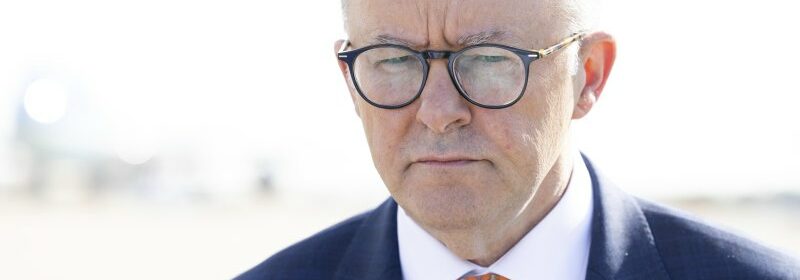Anthony Albanese to be a ‘no show’ at NATO, in ‘disappointment’ for Brussels

London: Prime Minister Anthony Albanese will not attend this year’s NATO summit The Sydney Morning Herald and The Age has learned.
It follows Foreign Minister Penny Wong’s decision to send a junior bureaucrat to last week’s foreign ministers meeting in Brussels, where NATO is headquartered, despite her Asia-Pacific counterparts attending to help coordinate the West’s responses to the war in Ukraine and China’s increasing aggression.
Prime Minister Anthony Albanese at the NATO summit in Madrid, Spain in 2022.Credit: Alex Ellinghausen
In an interview with this masthead last week, Jens Stoltenberg, NATO’s Secretary General, said the leaders of Australia, Japan, Korea and New Zealand, the so-called AP4, would be invited for the second time to the trans-Atlantic bloc’s annual gathering.
The elite grouping was only invited for the first time to NATO’s summit last year in Madrid, Spain and the then-freshly elected Albanese attended.
But he will not travel to this year’s gathering set for mid-July in Vilnius, Lithuania which has been a key, albeit small European Union and NATO member state, in standing up to Chinese economic coercion, after it allowed Taipei to open a de facto embassy.
While Parliament isn’t sitting in mid-July when the Vilnius meeting is scheduled, the prime minister has a busy travel schedule over the next few months, including attending the coronation of King Charles III in London in May.
Australia’s Deputy Ambassador to NATO David Dutton, Japan’s Minister for Foreign Affairs Yoshimasa Hayashi, NATO secretary general Jens Stoltenberg, New Zealand’s Foreign Minister Nanaia Mahuta, and South Korea’s Vice Foreign Minister Do Hoon Lee at NATO on April 5.Credit: NATO
The prime minister’s office was contacted for comment and declined.
The AP4 Foreign Ministers were also invited to last week’s meeting of foreign ministers in Brussels which dedicated an entire section of the meeting to Indo-Pacific strategy but Australia was alone in not attending at the ministerial level.
David Dutton, a junior bureaucrat from DFAT and the deputy ambassador to NATO went in Wong’s place.
The top of NATO’s agenda this year is the war in Ukraine which Treasurer Jim Chalmers on Monday partly attributed to the International Monetary Fund’s prediction that the next five years would produce the weakest economic growth the world has seen in more than three decades.
He said this would have implications for the budget he is due to hand down in four weeks’ time.
The opposition’s foreign affairs spokesman Simon Birmingham said Albanese should be attending NATO to demonstrate Australia’s “100 per cent commitment” to the rules-based order, our democratic partners and the defence of Ukraine.
“NATO has shown its ambition to strengthen ties with the AP4 and it is unquestionably in Australia’s interests to turn their ambition into an enduring reality,” he said.
The Senator said that French President Emmanuel Macron’s recent comments made after his visit to China, urging Europe to reduce its dependency on the United States and avoid getting involved in any conflict between Washington and Beijing over Taiwan showed why an Australian voice was needed at the table.
“The commentary from President Macron’s visit to China reinforces why it’s so important to seize security-oriented opportunities to maintain a European understanding of the strategic challenges in our region,” Birmingham said.
“More than a year on from Russia’s invasion of Ukraine is no time to be a no-show.
Joel Hickman is a non-resident fellow with the Transatlantic Defense and Security program at the Center for European Policy Analysis (CEPA.)
“Prime Minister Albanese should not only be at the NATO Summit, but he should be attending with a comprehensive, new package of military and humanitarian assistance for Ukraine.”
Joel Hickman, a non-resident fellow with the Transatlantic Defence and Security program at the US-based Centre for European Policy Analysis (CEPA) said Albanese’s decision was disappointing.
“Australia attended last year and in the last 12 months the situation in Ukraine and the Indo-Pacific hasn’t improved but probably worsened,” he said.
“And so you would think Australia would continue to prioritise that attendance because the reasons for attending last year remain the same this year.
“Behind closed doors there will be disappointment in Brussels that they’ve extended that invite and hand of friendship – they still really value the Australian relationship and that’s not going to go change but NATO’s making a play to really deepen that partnership.
“And there’ll be disappointment that Australia has missed this opportunity to demonstrate a strong unified message to would-be aggressors or strategic challengers – China being one of those.”
Get a note directly from our foreign correspondents on what’s making headlines around the world. Sign up for the weekly What in the World newsletter here.
Most Viewed in World
From our partners
Source: Read Full Article


